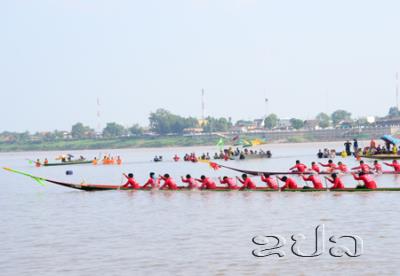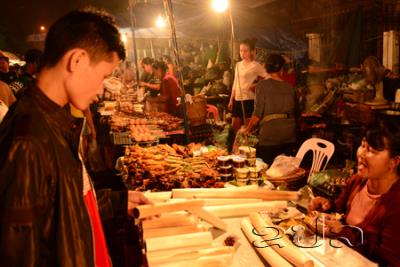KPL
(KPL) When news of the Boat Racing Festival is announced, people from all directions of Vientiane Capital and the provinces are interested and plan their journey to Tha Vat Chanh of Chanthaboury district where a number of boats representing public organizations, private sector companies and communities will compete for victories and prizes.

Boat racing
Sengthong Ph.
(KPL) When news of the Boat Racing Festival is announced, people from all directions of Vientiane Capital and the provinces are interested and plan their journey to Tha Vat Chanh of Chanthaboury district where a number of boats representing public organizations, private sector companies and communities will compete for victories and prizes.
The event provides a golden opportunity for entrepreneurs of all sizes to come and earn money as the event always draws huge crowds. Many vendors travel great distances to sell popular foods such as khalam- ping kai (sticky rice stuffed in bamboo tubes, and grilled chicken), tam mak houng (Lao traditional papaya salad), etc.

Khaolams and pingkais
The roadsides near the boat racing venue become hot spots for vehicle parking services. Every square metre of vacant land and footpath are occupied for pay parking service. Parking services usually fetch for its providers 3,000 kip per bicycle, 5,000 kip per motorcycle and 15,000 kip for each auto mobile. Some especially tricky opportunists may even charge much higher prices.
“Please come over here we have parking areas for you.” “Motorcycles turn right please!” These are common expressions that parking service boys usually yell.
On the larger commercial scale, corporate representatives of domestic businesses and even transnational companies occupy booths to show off their products and hopefully persuade onlookers to purchase their products or services. Other booths feature representatives of non-profit organisations, civil society organisations, international organisations and government organisations where they can publicise information and raise awareness about what they do and the role they play.
Information and entertainment are also provided by face-painted people who dance to the music rhythmic on floating boats going up and down the Mekong.
Voices coming from megaphones make compliance to decibel limits intentionally forgotten. Normal phone calls will not be picked up if they are not set for vibration mode.
People in communities located near the Boat Racing Festival venue will inevitably have visitors, some invited, some not, but all welcome. They will be given food, mostly likely khao poun (Lao noodle soup) and laap (minced, cooked (sometime raw) beef, pork, chicken or more delicious turkey mixed with tasty and spicy ingredients, favour enhancements and sprinkled with mint leaves...). BeerLao, Lao Lao (traditional whisky made from sticky rice) and various other kinds of drinks are also served by the host families as must haves. All are for free.
“I will not come to the office on the festival celebration day as I have to work at home doing house chores and arranging things for guests. You are all welcome to my party,” said Singkham Yengtavanh, one of the promising journalists at KPL News while revealing his excuse for his absence on Monday.
“I am going to go to the Boat Racing Festival tonight,” Mr Khamsing, a tire repair man from Dongdok village who is in his late 40s, said without worrying about the traffic jams he was going to face at the Boat Racing Festival days before the main celebration day on 28 Oct.
The Boat Racing Festival is paralleled by alms giving, a nationwide event held on the full moon of the 11th month of the Lao lunar calendar.
People will turn out at temples to give alms to monks. Buddhist people will bring bowls containing khao toms (cooked or boiled sticky rice wrapped in banana leaves) or sweets, bank notes, incense sticks, candles, flowers and the must have rice. A pair of candles is lit when prayers are chanted by monks. Alms are raised one by one to head level with a slight bowing of the head before being placed into monks’ alms bowls. People then raise their empty bowls to their heads with their heads bowing.
Clean water is drained from a bottle signifying that the offer has been made for intended recipients, including ancestors, late parents, relatives and even late animals. When the bottle is empty, it means that the alms giving is over. Nothing more is supposed to be done but wait for next alms giving in the following year and neither the BBC nor New York Stock Exchange can tell you when the next Ok Phansa alms giving will take place but Lao lunar calendar will surely do.
KPL